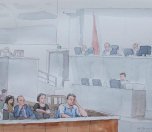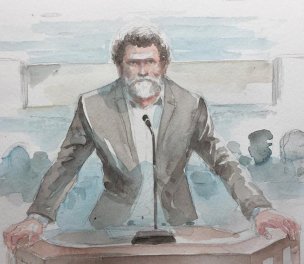Illustration: Murat Başol
Click to read the article in Turkish
The fifth hearing of the lawsuit filed into Gezi Resistance of 2013 was held at the İstanbul 30th Heavy Penal Court in Silivri, İstanbul on January 28.
In its ruling dated December 10, 2019, the European Court of Human Rights (ECtHR) has ruled that he shall be released immediately. However, in both the previous hearing on December 24, 2019 and the last one on January 28, the court has ruled that he shall remain behind bars.
Osman Kavala is the only arrested defendant of Gezi trial and has been behind bars for the past 821 days.
We are publishing the full statement of defense delivered by Osman Kavala in the last hearing, as published on osmankavala.org website:
***
'it is not legal reasoning, but groundless suspicion'
"As stated both in the European Court of Human Rights (ECtHR) judgment and in the dissenting opinions of the President and four judges of the Constitutional Court, there is no evidence in the indictment that could form basis to the accusations or raise reasonable suspicion.
"Hence, there is not a single piece of evidence that suggests I have planned, masterminded or financed an uprising against the government.
"On the contrary, all of the activities described in the indictment are activities guaranteed by our Constitution, and the conversations cited in the indictment are indicative of the fact that the charges are groundless and unreasonable.
"There is not any indication that the defendants were trying to come up with a secret plan. There is also no indication that the defendants were in any form of organizational relationship. There is no element in the conversations that indicates any confidentiality or attempt to obfuscation. For this reason, it is not legal reasoning, but a groundless suspicion, to think that there is confidential, hidden information that can associate me with the crime.
'Deprivation of freedom is a serious right violation'
"As stated both in the ECtHR judgment and in the dissenting opinions of the judges of the Constitutional Court, deprivation of one's freedom without evidence is a serious violation of rights.
"After the first arrest warrant, the renewal and extension of the arrest warrant without any new findings increases the severity of the violation and the responsibility of the Court in this violation.
"The unusual practice in my case is the insistence of the Court on the violation on the grounds that the ECtHR decision was not finalized even after the ECtHR's judgment defining the rights violations in detail and demanding immediate release. Yet, the ECtHR judgment encompasses the final legal findings as a result of thorough examination of the entire case file and evaluation of the information in the file and the justifications of the decisions in accordance with the ECtHR case law.
"The fact that the decision of violation of rights was taken unanimously is an indication of the legal integrity of the judgment and its justifications. Since the ECtHR is the last resort in interpreting the European Convention on Human Rights (ECHR), this decision constitutes an assessment of the arrest made in accordance with the norms and jurisprudence of the ECHR.
"The fact that the decision taken by the Constitutional Court on the same subject has become invalid with the ECtHR judgment, and therefore the Court's not mentioning the Constitutional Court decision during its last ruling, is a concrete indicator of the severity of the ECtHR decision.
"Given the situation, the Court's ignoring the clear and precise legal findings in the ECtHR judgment is not understandable. This behavior gives the impression that the Court remains insensitive not only to the ECtHR judgment, but also to the mandatory provisions in the European Convention on Human Rights and in our Constitution that one cannot be arbitrarily deprived of one's freedom. The ECtHR judgment is a valid judgment and as long as it does not change, the Court will appear as a resisting authority in violating the articles of the ECHR.
'Insistence on detention despite ECtHR judgment'
"Under these circumstances, it is not possible for the defendants to place confidence in that the trial process is carried out according to the ECHR norms. I am deeply concerned that the insistence on my detention despite the ECtHR judgment will also affect the outcome of the case.
"This behavior, which is suggestive of serving to cover the unlawfulness of the long detention, creates a situation that disrupts the Court's freedom of fair decision making and obliges the Court to make a heavy conviction.
"I believe that my detention should be terminated immediately in order to eliminate the negative effects of my unlawful detention on the verdict.
"The termination of my detention in this hearing will not only end the unlawfulness that lasted for 2 years and 3 months, but will also allow the next course of the case to be conducted in accordance with the ECHR and the Constitutional norms and the case law of the ECtHR." (SD)








-132.jpg)



